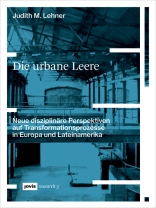Economic, ecological, and social crises not only become manifest as interruptions in societal development, but also as spatial phenomena. A key example of these are urban wastelands such as abandoned factory sites, large-scale unoccupied residential buildings, and unused spaces at street level. They are the visible results of urban change, highlighting challenges for disciplines such as architecture and urban design.
This book explores urban transformation using the concept of urban voids. Wastelands hold manifold possibilities for urban development, as it is here that the strategies of planners meet the collective and self-managed tactics employed by local residents. The author analyses case studies from Latin America in order to open up future angles for space-shaping disciplines in Europe.
关于作者
Judith Lehner












